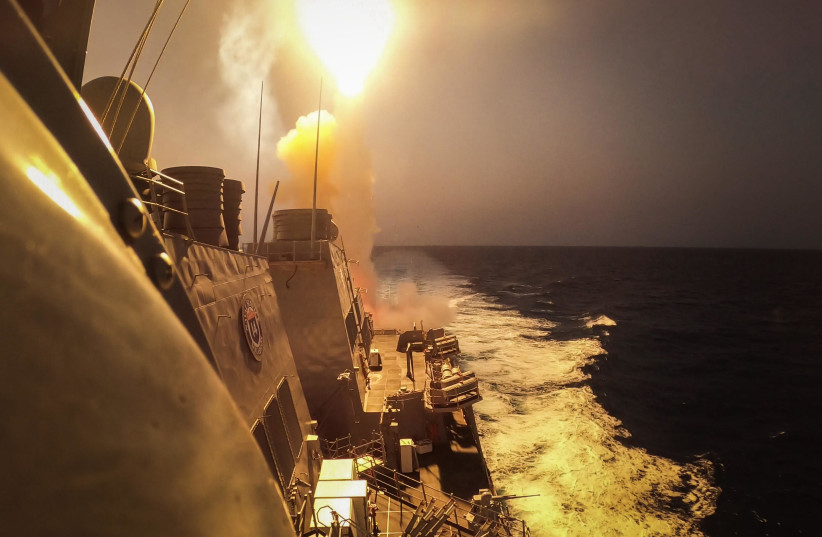The Iranian-backed Houthis in Yemen are increasing their threats to Israel and the Middle East. On October 18 they launched drones and missiles targeting Israel, which were intercepted by a US warship in the Red Sea. The incident continued for several hours.
On Friday, October 27, another incident took place in which drones and projectiles landed in Egypt. That same day, Israel’s Foreign Ministry said “Israel condemns the harm caused to Egypt's security forces by the missiles and drones launched by the Houthi terrorist organization with the intention of harming Israel. The Houthis a proxy of the Ayatollah’s terrorist regime in Teheran, which also controls the Hezbollah, Islamic Jihad and Hamas terrorist organizations.”
The two threats now appear to be part of a growing pattern after sirens sounded in Eilat on Tuesday, October 31. In this incident reports said that an aircraft, likely an unmanned aircraft, had caused the sirens. The pro-Iran media Al-Mayadeen said that a drone had threatened Eilat.
The sirens in Eilat come two days after the Houthis said they had formed a joint operations room to confront Israel. The article at Al-Mayadeen about the Houthi threats said that the Houthis support a Palestinian state. The official slogan of the Houthis is “Death to America, death to Israel, curse the Jews.” The movement says they want a Palestinian state over the whole land, and they do not recognize the 1948 or 1967 concepts of two states. As such, they embrace the concept of “From the river to the sea.”
The Houthis said over the weekend that "There are joint operations rooms and efforts that monitor and work to confront any Zionist foolishness if it invades Gaza by land, and we are monitoring the situation closely."

The Houthis claim that “The war in Palestine has become a war against Islam, in which the West and the United States are mobilizing alongside the Zionist enemy.” This is part of the general attempt by Iran to rally proxies in the region to attack the US and Israel. For instance Iranian-backed militias in Iraq and Syria have carried out 25 attacks on US forces since October 7.
For instance, Reuters said on Tuesday, “two armed drones targeted Iraq’s Ain al-Asad airbase, which hosts U.S forces, but there were no casualties or damage, a security source and a government source told Reuters on Tuesday.”
The Houthis: Iran's weapons test bed
The use of drones by the Houthis and by Iran-backed groups in Iraq and Syria is all part of the same Iranian octopus nexus. Iran exports drone technology to these groups. It also exports drones to Russia. The Iranian Shahed 136 first showed up in Yemen in 2001. As such, the Houthis are not only a proxy but a test bed for Iranian weapons. The Houthis have carried out drone and missile attacks on Saudi Arabia and the Gulf since 2015. China helped broker Saudi-Iran reconciliation earlier this year but the Houthis continue to threaten Riyadh from Yemen.
The Houthis are part of the Iranian desire to globalize and regionalize the October 7 massacre by Hamas. Iran has used its media to spread claims that the US is involved in Israel’s war on Hamas and therefore try to make this a regional conflict with the US. Turkey has also sought to slam the US as well as Israel. China and Russia have refused to condemn Hamas. This illustrates that this is a much larger war than just Israel fighting Hamas. Iran and Russia see it as a way to challenge the US. Russia believes this is about a multi-polar world order, they see the Hamas war as a kind of larger symbolic proxy war against the West.
“The Battle of Al-Aqsa Flood has begun and will destroy everything that the occupation forces and global imperialism have built," the Houthi official Mashdi al-Mashat said, noting that “there is no such thing in the Arab region as Israel." Aqsa “flood” is the Hamas name for its October 7 attack. Israel expanded ground operations in Gaza over the last few days and Hezbollah has increased threats against Israel, as well as terrorists in Syria and the Houthis. This is Iran’s plan to “unify” fronts against Israel.
The Houthi official claimed that "the West escaped from its problems and wars by exporting the Jews to the Arab world, and created an entity for them outside the topography of the region.” This is tradition Iran-backed Houthi antisemitic rhetoric. Jews have lived in the Middle East for thousands of years, including in Yemen. The Jewish presence in Yemen predates the modern Houthi movement.
The October 18 attack by the Houthis included numerous drones and missiles, some with large warheads. The October 27 attempted attack was thwarted but the projectiles landed in Egypt, showing the growing Houthi threat to the region. There was also another incident reported by Maariv overnight from October 29 to 30. The October 31 incident is still under review.
Saudi Arabia also put its forces on alert after a recent clash, according to Bloomberg on October 30. The Saudis have intercepted Houthi missiles in the past. Saudi Arabia’s Defense Minister Prince Khalid bin Salman was in Washington on Monday and he discussed the Kingdom’s support for a ceasefire in Gaza. According to Arab News, “on Yemen, Prince Khalid wrote: ‘We also discussed the Kingdom’s efforts in Yemen to end the crisis and achieve peace.’ The White House said: ‘[Jake] Sullivan welcomed the significant de-escalation of the conflict over the past year and a half and endorsed Saudi-led efforts to bring the war to a close altogether.’”
